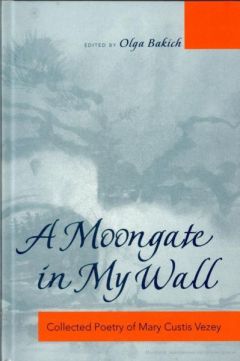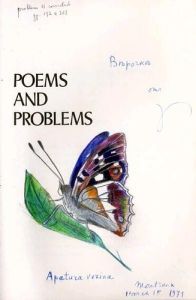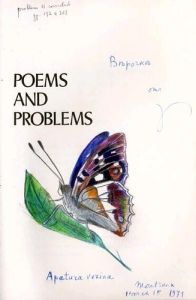Мария Визи - A moon gate in my wall: собрание стихотворений
88
Translation of "Есть демон утра. Дымно-светел он (1914).
89
The poem is dated 10 August and dedicated to P. (see note on poem 24) in the manuscript.
90
In one of the copies of Stikhotvoreniia Mary Vezey corrected the second line of the first stanza to “полыхнула на небе звезда." The poem was later included in the collection Golubaia trava, with this correction.
91
Translation of "Ты божий день. Мои мечты" (1902).
92
For Г.И. see note on poem 17.
93
Fоr Володя Визи see note on poem 54.
94
Translation of "Ветер принес издалека" (1901).
95
For W.F. see note on poem 15.
96
Translation of "Есть в дикой роще, у оврага" (1898). A misprint ("lies deep below the roots end weeds") in Stikhotvoreniia has been corrected in the present edition.
97
Dated 5 June in the manuscript. For Леля Мосолова see note on poem 21.
98
Translation of "We needs must be divided in the tomb," Sonnet XXV from George Santayana Sonnets and Other Verses (1894).
99
Translation of "Oh if the heavy last unuttered groan," Sonnet XXVI from George Santayana Sonnets and Other Verses, 1894.
100
Translation of "Свирель запела на мосту" (1908).
101
For М.А. Зырянова see note on poem 46. The quote m the text «Как много в этом слове / для сердца юного слилось» is modified from the lines «Москва… как много в этом звуке/Для сердца русского слилось!/Как много в нем отозвалось!» in A.S. Pushkin’s Eugene Onegin, Chapter 7, XXXVI.
102
Translation of "Канцона вторая" from N. Gumilev, Костер(1918), and later included in К синей заезде (1923). Vezey translates the modified text in К синей звезде, where the second stanza is "Переброшен к нам светлый мост./И тебе о нас говорят / Вереницы ангелов-звезд,/Что по-разному все горят." See N. Gumilev, Собрание сочинений, Washington, 1961, II, р. 288, note on poem 237.
103
Translation of «Усните блаженно, заморские гости, усните» (1908).
104
The manuscript is dated 9 November 1929. In the 1960s the poem was published in the newspaper Russkaia zhizn', San Francisco, where the first line of the second stanza read: «Даже в самый трудный час в пустыне», and the last line of the poem "и позволил песни петь людские?» The poem was later included in its original form in the collection Golubaia trava, p. 9.
105
Later included in Golubaia trava, p. 16, under the title «На берегу».
106
Later included in Golubaia Irava, p. 13.
107
Later published in the journal Delo, San Francisco, no. 3,1951, and then included in the collection Golubaia trava, p. 18, under the title «Самарянин», for which see Luke 10:33.
108
Later included in the collection Golubaia trava, p. 20.
109
Later included in (he collection Golubaia trava, p. 11, under the title «В Великий пост» where the third line of the second stanza was «и стану вся прозрачней воска».
110
It was later included in the collection Golubaia trava, p. 21, with a dedication to «B.B.» i.e., Vladimir Vezey; see note on poem 54.
111
It was later published in the journal Delo, San Francisco, no. 3, 1951, and then included in the collection Golubaia trava, p. 12.
112
Later included in the collection Golubaia trava, p. 23. The epigraph is taken from the poem «To Helen» by Edgar Alan Poe.
113
It was later included in the collection Golulwia trava, p. 19
114
It was later published in the annual Den' russkogo rebenka, San Francisco, no. 18, 1951, p. 241, where the first two lines of the last stanza read: «и от упавшего луча, / от лунного меча». It was included in the collection Golubaia trava, p. 10, under the title «Ноктюрн 1».
115
It was later published in the annual Den' russkogo rebenka (San Francisco), no. 18, 1951, p. 243.
116
Тамара is the heroine of M.Iu. Lermontov's poem Demon.
117
It was later published in the journal Vozrozhdenie. Paris, no. 215, 1969, p. 57, where the first line was "Когда погаснут на пути огни." It was then included in the collection Golubaia trava, p. 6, in its original from. In Golubaia trava the poem is dedicated to "E.T." — Evgenii Fedorovich Tourkoff, Mary Vezey's husband. Poems 216, 219, 221, 374, 400, 462, and the whole of the collection Golubaia trava are dedicated to him.
118
This and the next six poems comprise a cycle. The first poem of the cycle was later published in the journal Khnrbinskie kommercheskie uchilishcha Kit. Vost. zhel. dor., San Francisco, no. 4,1957, p. 53, without the epigraph. Liter the first poem was included in the collection Golubaia trava, p. 22, under the title «Мимоходом» and with an epigraph from a poem of Andrei Blokh, an emigre poet who lived in France. The dates of his birth and death are not known; he published two collections of poetry in Paris in 1927 and in 1929.
119
Dated 18 September and dedicated to K.M. in the manuscript. Poems 200 and 304 are also dedicated to him. In the manuscript the fourth line of the first stanza read «и мягче руки, и пушистей косы».
120
Dedicated to К.М. in the manuscript, where the third and fourth lines of the fourth stanza road «и больше будет нечего просить, / и лучшего ты счастья не захочешь!» Poems 198 and 304 are also dedicated to him.
121
It was later included in the collection Golubaia trava, p. 17 under the title «Плач.»
122
The manuscript has a notation «31 августа ночью, у В. на даче».
123
In one of the copies of the collection Mary Vezey added a handwritten dedication: «B.B.» See note on poem 54.
124
The whole collection is dedicated "Моему мужу," i.e., to E.F. Tourkoff. See note on poem 193.
125
For E.T. see note on poem 193.
126
Дочка: Ol'ga Evgen'evna Tourkoff. Poem 434 is also dedicated to her.
127
It was first published in the journal Kharbinskie kommercheskie uchilishcha Kit. Vost. zhel. dor., San Francisco, no. 10, 1971, p. 61, without dedication or epigraph; the first two lines of the last stanza read: "и будет хмурое небо / укутывать купола." For Андрей Блох see note on poem 195. For E. Мосолова see note on poem 21.
128
For E.T. see note on poem 193.
129
Golubaia trava, p. 27. First published in the journal Kliarbinskie kommerclieskie uchilislicha Kit.Vost. zliel. dor., San Francisco, no. 10,1971, p. 61, without title or dedication; the name Salfeve was given in Russian transcription in the first line. In the collection Golubaia trava there was a misprint in the second line of the first stanza ("где острогов Альп чернили склоны"), which was corrected by Mary Vezey in one of the copies. For B.B. see note on poem 54.
130
The manuscript is dated 7? February 1964, Wednesday. The poem was first published in the anthology of Russian emigre poetry Sodruzhestvo, Washington, 1966, p. 117, without title or dedication. For E.T. see note on poem 193.
131
The poem was first published in the anthology of Russian emigrie poetry Sodruzhestvo, Washington, 1966, p. 118, under the title «Ноктюрн».
132
E. и В. Сумбатовы: Prince Vasilii Aleksandrovich Sumbatov (1893–1997), an emigre poet, and his wife Elena Aleksandrovna. Sumbatov published three collections of poetry Stikhotvoreniia, Munchen, 1922, Stikhotvoreniia, Milan, 1957, and Prozrachnaia t'ma, Livorno, 1969.
133
For Eva Doyle see note on poem 9.
134
It was first published in the anthology of Russian Emigre poetry Sodruzhestvo, Washington, 1966, p. 121, where the poem ends with two more lines: "Упокой, Господи, душу усопшего /раба Твоего Иосифа."
135
First published in the journal Vozrozhdenie, Paris, no. 215, 1969, p. 57.
136
The manuscript has the dedication "B.B. (картинка с натуры)," and the epigraph is dated 1967. For B. Bизи see note on poem 54.
137
First published in the journal Kharbinskie kommercheskie uchilishcha Kit.Vost, zhel. dor., San Francisco, no. 11), 1971, p. 62, without the title or epigraph. Marco Aguilar (1944-) is a Costa Rican poet, who has published the collections Raigambres, Turrialba, Costa Rica, 1961, Cantos para la semana, Turrialba, Costa Rica, 1962, and Emboscnda del Tiempo, San Jose, Costa Rica, 1988.
138
First published in the journal Kharbinskie kommercheskie uchilishcha Kit. Vost. zhel. dor. (San Francisco), no. 10, 1971, p. 62, without the title.
139
The poem was first published in the journal Vozrozhdwnie (Paris), no. 118, 1961, p. 62, without title or dedication. The third line in the second stanza read: "пролетали в кильватер, четыре, бесшумно, легко," and the fifth line of the same stanza "как кочующий парус, исчезли за мыс, далеко." It appeared in the anthology of Russian emigre poetry Sodruzhestvo, Washington, 1966, p. 115, also without title or dedication, where the fifth line of the second stanza read "как кочующий парус, умчались на мыс далеко." Крузенштерн: Iustina Vladimirovna Kruzenshtern-Peterets (1903–1983), emigre journalist and poet, who lived in Harbin, Shanghai, and the USA, a friend of Mary Vezey.
140
It was first published in the journal Vozrozhdenie, Paris, no. 118, 1961, p. 62, without title or dedication. The second line of the second stanza read: "ты таких не видел и во сне," and the last line of the poem "что тебя бы привела ко мне?" М. Маринич: М.P. Marinich, who lived in Canada, a friend of Mary Vezey.
141
The manuscript is dated 15 March 1962. The poem was first published in the journal Sovremennik, Toronto, no. 19, 1969, p. 47, where the first line read: «Как моя душа черна сегодня.»
142
А. Васильковская: Elena Vasil'evna Glushkova (died in the early 1970s), an emigre poet, writing under the pseudonym Aleksandra Vasil'kovskaia, who lived in California and published two collections of poetry Uzelok, San Francisco, 1957, and Zapushchennyi sad, Palo Alto, 1971.
143




